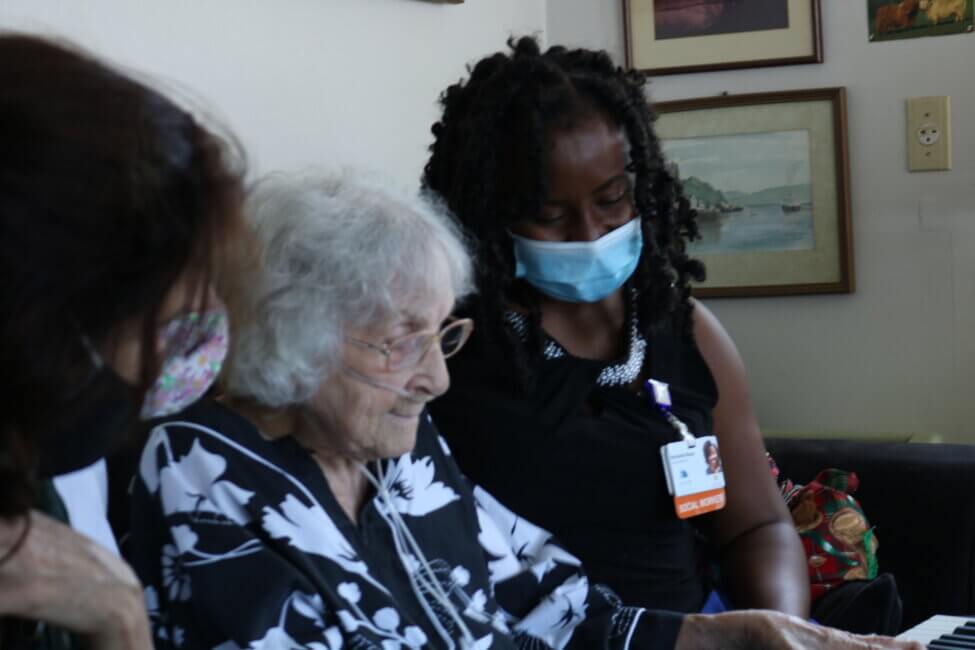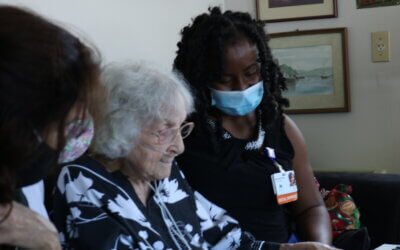Social Workers: Experts in Empathy
LifePath Hospice social workers Berlande Blaise and Alicia Wldoynski share the challenges and goals they share as social workers in the hospice setting.

She hadn’t played piano in years. At 96-years-old, it seemed her playing days were behind her. In comes a LifePath Hospice social worker. Days later, Anne Donlin was playing piano again, reliving the days when her talent filled clubs with music and stirred patrons all those years ago. The piano came from the Chapters Health Foundation, but the idea born of empathy and love, came from her social worker.

Doctors, nurses, aides, chaplains and volunteers all play a vital role in the support and care of our patients but who can provide the resources they cannot? Who is the extra set of eyes to identify the needs others may overlook? Our social workers … that’s who. From hospice to grief services and everything in between, social workers are there along every step of the journey.
Klaus Peterson’s journey brought him to the Melech Hospice House. During a visit with his care team, he had one simple request … steak. A small request, but it made a difference.

Ultimately, that’s the mission for our social workers. Make a difference in the lives of patients and families during the time they have left together. Be an effective steward of resources and make the journey easier. What are the patient’s goals? Does their family have the support they need? If they’re a veteran, are they aware of all the benefits available to them? The concerns of every patient and family are different. It’s the social workers’ mission to identify and resolve them using the resources at their disposal and others outside the organization.
Social Work in a Hospice House
It’s not long term. Patients are only at the hospice house for their personal comfort or to relieve weary caregivers, who have faced unprecedented challenges in the last year. Although the patient’s stay may be short, the impact his or her social worker can have lasts long after they depart. Symptom management, meal deliveries to the home, grief services, advance directives, funeral planning, you name it. A social worker in the hospice house can help a family prepare for life after their loved one passes away or returns to the comfort of their home.
Social Work at the Home
If the patient returns home, the support doesn’t end. Comprised of similar workers seen in a hospice house, home teams transition their skill set to the home setting. In this setting, the social worker serves as a conduit to any and all resources the patient and caregivers need such as Meals on Wheels, respite care and wish requests. Social workers also coordinate with the care team, most often the nurses and aides, to ensure the patient health, spiritual and emotional needs are met. Education also plays an important role in social service. Families may not know whether their loved one is appropriate for hospice care. It’s the duty of the social worker to inform them.
Challenges of the COVID-19 Pandemic
The arrival of COVID-19 presented extraordinary challenges to all healthcare workers. Some of those challenges remain even though many states, like Florida, have found ways to slowly reopen. For social workers, the pandemic has exacted both a physical and emotional toll. Among the challenges was the inability to provide respite care and home visits for caregivers. With nursing homes and assisted living facilities wary of accepting new residents, who could these families turn to? That’s where tele-health came in. Social workers used technology to say in touch with families. However trying to comfort and support them from a distance is no easy task.
Social service is not easy to begin with. It requires the utmost patience, empathy, understanding and dedication. Many people work five days a week and then enjoy their weekend. However, the needs of a hospice patient and their family don’t follow a certain schedule. Families and caregivers may call for help when it’s inconvenient for everyone else. And a social worker will be there to answer the call.
Chapters Health System is committed to serving the needs of its patients, families, caregivers, health providers, partners and communities.
Discover more details and information about support services.
For more information, please call our helpful Chapters Health and HospiceHelp24® team at 1.866.204.8611 or Contact Us.
Keep Exploring















